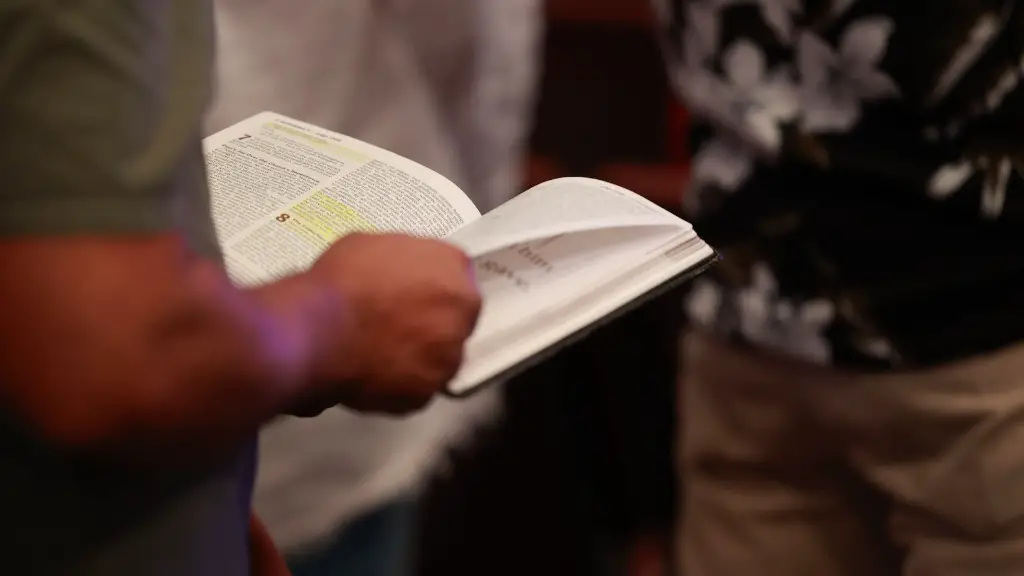Physical Appearance
The Bible does not tell us what Hell actually looks like and there is a lot of speculation as to what our life after death will be like. But there are several verses that describe various aspects of Hell that give us an idea of its physical appearance. In the Bible, the imagery of Hell specifically mentions fire, burning and smoke, which can help to paint a vivid picture of the endless abyss. For example, The Book of Isaiah in the Old Testament reads, “Therefore is the anger of the Lord kindled against his people, and he hath stretched forth his hand against them, and hath smitten them: and the hills did tremble, and their carcases were burned in the midst of the streets.”
This Scripture reveals that God punishes those who abandon him with burning and smoke. The Book of Revelation also speaks of Hell’s physicality with verses like, “And the devil that deceived them was cast into the lake of fire and brimstone, where the beast and the false prophet are, and shall be tormented day and night for ever and ever.”
According to some Christian theologians, Hell exists in an eternal pit beneath the Earth, which is why it often has associations with fire and smoke.
Life in Hell
If we take these Biblical descriptions of Hell at face value, then life in this realm appears to be quite bleak. According to several references in the New Testament, Hell is a place of isolation, where believers “shall be said, Depart from me, ye cursed, into everlasting fire, prepared for the devil and his angels.” We also know there is a separation between Heaven and Hell, which could imply that once in Hell, one can NEVER escape from its grasp.
While these descriptions give us a glimpse into what life could potentially be like in Hell, a complete picture is still lacking. But one thing is for certain; in the Bible Hell represents a place of punishment for those who choose to reject the Lord, and where “their worm dieth not and the fire is not quenched”.
Punishment in Hell
The punishments in Hell are just as mysterious as the place itself. In the Bible, there are several passages that speak of eternal suffering and torment in the afterlife. One particularly graphic example can be found in the Book of Matthew, which reads, “And these shall go away into everlasting punishment, but the righteous into life eternal.”
This expression could imply that those who are wicked will be subjected to indescribable suffering in Hell. Other verses allude to this idea, but do not explicitly state it. For instance, the Gospel of John reads, “And these shall go away into everlasting punishment: but the righteous into life eternal.”
The Bible does not give us a clear picture of the punishments in Hell, but allusions to eternal torment imply that it is, indeed, a place of extreme suffering.
The Meaning of Hell
Many Christian theologians believe that Hell is not a physical place, nor is it a place of physical punishment. Instead, Hell is seen as the spiritual separation from God and His holy presence, which is said to be the ultimate punishment. According to the Bible, Heaven is a place of ultimate joy and bliss, so Hell is seen as its antithesis- a place of endless sorrow and despair. This is why it is often referred to as “the outer darkness”, indicating the immense and unending separation from the light and joy of God’s presence.
Hell According To Different Religions
Not all faiths ascribe to the same concept of Hell and punishment after death, so it is important to look at different perspectives on this issue. For example, many Hindus believe in the concept of reincarnation, so their version of Hell is not a physical place but more of a spiritual cycle of life and death. Judaism also has a unique perspective on the afterlife and does not use the term “Hell” as other religions do. Instead, the Jewish tradition teaches that the wicked will be punished in an individualized manner that is determined by their actions in life.
Perception of Hell Today
The way people view Hell has evolved over time and many people today do not believe in its existence at all. Some believe that Hell is simply a metaphor for the consequences of negative choices made in life, while others believe in a literal Hell. So while the concept of Hell may be viewed differently today, it is still an important part of many religions and spiritual beliefs.
Conditions in Heaven
The Bible gives us a much clearer picture of Heaven than it does of Hell. For starters, the Bible tells us that Heaven is a place of unwavering peace and joy, where believers “shall rejoice and be in good health”. According to the books of Revelation and Isaiah, Heaven is also a place of eternal beauty and splendor, with streets of gold and pure rivers that give off a glorious light:
“And the city had no need of the sun, neither of the moon, to shine in it: for the glory of God did lighten it, and the Lamb is the light thereof.”
Heaven is a place that transcends the physical realm and is instead a realm of spiritual joy and connection with God.
Entry Requirements To Heaven
The Bible is clear that there is only one way to gain entry into Heaven: believing in Jesus. In the book of John, Jesus says, “I am the way, the truth, and the life: no man cometh unto the Father, but by me.”
In this scripture, Jesus claims to be the only path to Heaven, which is why many Christians believe that it is only through Him that one can gain entry into Heaven. But of course, this is still debated among different religious factions.
Purpose of Hell
The purpose of Hell is highly contested, especially among Christians. Some believe that Hell is a place of punishment for unbelievers and sinners, while others believe it is a place of purification, where souls can grow and learn. Still, others believe that it is simply a metaphor for the pains and suffering of this life. Ultimately, the purpose of Hell is still much debated and uncertain.
Eternal Torment In Hell
The Bible does not explicitly state that Hell is a place of eternal torment, but there are several verses that suggest this is the case. For instance, the Book of Revelation mentions, “and these shall go away into everlasting punishment.” This could imply that those who enter into Hell are subjected to an eternity of suffering, which is a much darker interpretation than those who believe in purification or rehabilitation.
Whether Hell is a place of eternal torment or not is still up for debate, but these verses could be interpreted as references to eternal punishment.
Escape From Hell
The Bible does not explicitly say whether or not one can escape from Hell. Some believe that it is possible to leave Hell, while others believe that once in Hell, there is no escape. Ultimately, the concept of escape from Hell is largely based on personal belief and interpretation of Biblical text.
Length of Time in Hell
The length of time spent in Hell is, much like its purpose, highly contested. Some believe that souls may remain in Hell for eternity, while others read the Bible to mean that Hell could be an interim stage before entering into the afterlife. Ultimately, how long a soul remains in Hell is dependent upon personal interpretation and opinion.
Possibilities of Forgiveness In Hell
The Bible does not explicitly state whether or not one can be forgiven for their sins and be released from Hell, but many Christian denominations believes that forgiveness and redemption is possible, even for those in Hell. This is largely based on the belief that Jesus died for our sins and desires for all of humanity to be saved and brought into His kingdom. Therefore, it stands to reason that those who are in Hell have the potential to be forgiven and released from its grasp.
Non-Believers in the Afterlife
The Bible does not give us a clear answer as to what happens to non-believers in the afterlife. However, many Christian theologians believe that these souls will remain in an eternal state of darkness, disconnected from God and His divine love. While this interpretation is still up for debate, the Bible does tell us that those who reject the Lord in life will experience punishment in the afterlife.



